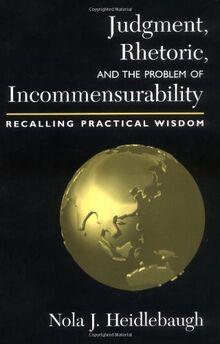
Nola J. Heidlebaugh considers the question of how, in an age of diversity and pluralism, contemporary society can productively address divisive issues. Looking at the dominant postmodern understandings of rhetoric, as well as at arguments extracted from Thomas S. Kuhn's The Structure of Scientific Revolutions, Heidlebaugh finds that many social debates are regarded as intractable because of an incommensurability between the conceptions figuring in the competing positions taken. She offers a redefinition of rhetoric that moves beyond stalemates and produces more inventive arguments.
Heidlebaugh's review and critique of Cartesian epistemology invites arguers to see opposing positions as beyond argumentative reconciliation. In the place of attempts to resolve disagreements demonstratively she suggests employing the resources of preliterate poetics, of Aristotelian topical theory, of the discussions by pre-Socratic sophists, and of Ciceronian stasis theory to rediscover a rhetoric that recognizes itself as situated, contingent, practical, productive, and artistic. Heidlebaugh reconceives these key notions in order to contrast the rhetoric she recommends with the stalemate-producing forms of rhetoric that proceed from fixed theoretical authority and result in an either-or judgment. She believes that the rhetorical methods of commonplaces, topics, and stasis theory can be used to invent novel conceptualizations and arguments from the raw material of disagreements and uses examples from the abortion debate to illustrate her case.